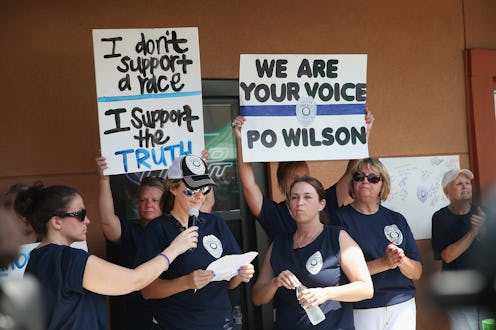News
Darren Wilson Grand Jury Will Meet One Last Time
The community of Ferguson, Missouri, has been bracing for the grand jury decision for weeks, and it looks like the wait may be over by this weekend. CNN reports that the grand jury decision to indict police officer Darren Wilson in the fatal shooting of 18-year-old Michael Brown could come as soon as Friday, when the grand jury will meet for possibly the last time. Citing law enforcement officials briefed on the upcoming plans, CNN reports that St. Louis County prosecutors are slated to present more evidence to the grand jury before the jurors begin deliberating on the high-profile case.
The unnamed sources said a grand jury decision could come quickly — even on the same day of the hearing. If that happens, the jury will have to give authorities at least 48 hours before they make a public announcement, which means Sunday will be the earliest day for the release of the long-awaited decision. However, the sources told CNN that prosecutors could change the plans. The sources also didn't elaborate on the nature of the evidence reportedly being presented to the grand jury on Friday.
Ferguson residents are bracing for the grand jury's decision, which could spark another wave of city-wide protests and reignite the deep-seated tensions between Ferguson's African-American residents and the city's nearly all-white police force. The Ferguson-Florissant School District told parents on Wednesday that every school in the district will either close early or close entirely the day the grand jury's decision is handed down. If the announcement is made in the evening, then the schools will close at their normal times.
Acting Superintendent Lawrence W. Larrew said in a letter to Ferguson-Florissant parents:
The District is in communication with local municipalities and law enforcement. Our long-standing partnerships and open lines of communication with these entities will be essential as we seek to make educated decisions and keep our community informed. As we anticipate an announcement, our primary concern is keeping students and staff safe.
Michael Brown was unarmed when he was killed by Wilson, who shot the recent high school grad six times, including a fatal shot to the head. Over the last few months, conflicting reports of the shooting have surfaced, with some bystanders claiming Brown had his hands up in the street; others say he was moving toward Wilson when he was fatally shot.
Brown's death garnered national attention almost immediately, first through the hashtag #IfTheyGunnedMeDown, which criticized the way the media portrays African-American shooting victims as thugs and criminals. The hashtag was reminiscent of the "hoodies and Skittles" protest following the death of 17-year-old Trayvon Martin, who his assailant, George Zimmerman, said looked suspicious because he was wearing a hoodie.
Then, U.S. Attorney General Eric Holder announced a federal investigation into Brown's death. Weeks later, Holder launched a separate, broader civil rights probe into not only the Ferguson Police Department, but also forces in the St. Louis area. Investigators are looking at incidences of excessive force by police officers, profiling and other racially charged issues.
Holder made an unprecedented visit to Ferguson in August, and his commitment to providing civil justice to Ferguson residents has been evident throughout his final months at the Justice Department. On Monday, the outgoing attorney general compared Brown's death to the 1955 murder of Emmett Till, an African-American teenager who was brutally killed by two white men in Mississippi:
The struggle goes on. And it's not only Ferguson, there are other communities around our country where we are dealing with relationships that are not what they should be, be they official communities they are supposed to serve or whether it's on a more personal level. There is enduring legacy that Emmett Till has left with us that we still have to confront as a nation.
Images: Getty Images (2)
